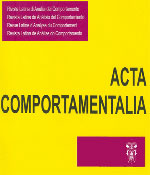Contextual factors of remembering: experimental and theoretical contributions
DOI:
https://doi.org/10.32870/ac.v19i3.28046Keywords:
Memory, Remembering, Contextual Factors, Field FactorsAbstract
Experimental data and theoretical considerations about the effect of contextual factors in memory are presented in this paper. The experimental data are characterized by a Longitudinal Design with Repeated Measures and their implementation in daily spaces, but also by introducing a period of a week between learning and recall phases and a perceptual-motor task, besides a cognitive task ordinarily used in traditional research. Two studies are reported, both including a cognitive task and a perceptual-motor task. The results confirm the absence effects on remembering due to contextual factors. Those results are compared with other experimental data, showing consistent effects of setting factors in other experimental situations. In a theoretical approach, the advantages of a field theoretical model are exposed for de definitions of factors affecting remembering performance but also for general explanation of quantitative changes in any psychological performance.Downloads
Download data is not yet available.
Downloads
How to Cite
Roca i Balasch, J., & Serra Payà, N. (2011). Contextual factors of remembering: experimental and theoretical contributions. Acta Comportamentalia, 19(3). https://doi.org/10.32870/ac.v19i3.28046
Issue
Section
Articles
License

<a rel="license" href="http://creativecommons.org/licenses/by-nc-sa/4.0/"><img alt="Licencia de Creative Commons" style="border-width:0" src="https://i.creativecommons.org/l/by-nc-sa/4.0/88x31.png" /></a><br />Este obra está bajo una <a rel="license" href="http://creativecommons.org/licenses/by-nc-sa/4.0/">licencia de Creative Commons Reconocimiento-NoComercial-CompartirIgual 4.0 Internacional</a>.






